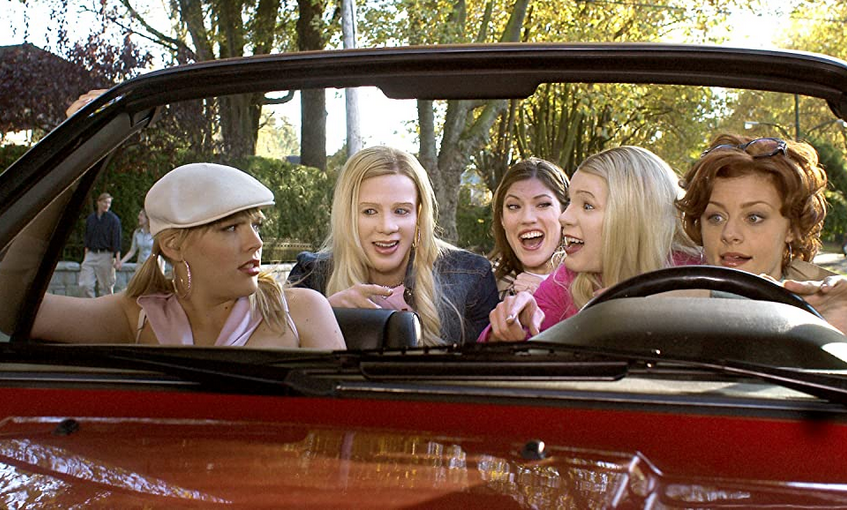White Chicks (dir. Keenan Ivory Wayans, 2004)- Review
“You know who loves White Chicks the most?” philosophised Marlon Wayans in a 2020 interview. “White chicks. That’s how you know it’s a good movie… It was a great exploration of gender, of race, of pop culture, and done with kid gloves so everybody could laugh.”
Arguably, the 2004 cult classic has aged remarkably well, not despite, but because of its unusual subject matter. By making the social status quo of the early 2000s into a punchline, rather than an unchallenged backdrop, White Chicks has avoided the awkward curdling of many late-night comedies of its time. While movies from Wedding Crashers to Knocked Up catered to locker room humor and bro culture, trying to skate over potentially sensitive social issues, their participation whiffs of complicity in a #FreeBritney age. Declining to punch down in the spirit of the era - as Craig Ferguson observed of Britney’s treatment, as a Platonic ideal of the White Chick - the Wayans brothers poke at broad swathes of aughts society, for a dose of goofy nostalgia without the guilt.
Marlon and Shawn Wayans play bumbling cops Marcus and Kevin, assigned to shepherd twin blonde heiresses to the Hamptons, under caution of a kidnapping plot. When the proliferation of Louis Vuitton luggage and yappy chihuahuas in the car causes an accident in which the girls' faces are scratched, the cops decide to use FBI disguises to impersonate their charges for the weekend while they recover in a hotel. The utterly ridiculous premise - which sees the Wayans laminating themselves in chalk-white silicone and donning cyborg-esque blue contacts - takes the theme of men infiltrating women’s spaces (see Some Like It Hot) and puts it on steroids. With the additional invasions of racial, class, and institutional boundaries, the film sets up a basis for not only farcical, immature sketch humor, but surprisingly insightful and sensitive social commentary.
The theme of the movie - a look at the world through someone else’s eyes, a device that has piqued audiences from the days of the Roman Saturnalia to Eddie Murphy’s Trading Places - is striking for its encounter with ‘girl world’. Bucking the dominant narrative of the time, the white chicks - their bodies and perceived identities - are not the primary butt of the joke. As Marcus and Kevin befriend the satellites of the heiresses they are impersonating, they discover that womanhood in the Hamptons is utterly savage; rather than ridiculing these put-upon society females, the film hinges on the joke that as confident, quick-witted black men, the cops are actually the most successful ‘white chicks’ of them all.
Eschewing the typically lustful, boob-centric humour of R-rated 2000s comedy, the movie encroaches onto the secret world of women to depict it as an unglamorous, soul-crushing shambles, rather than a sexy male fantasy. The Wayans juice both quotable one-liners and depressing echoes of reality from scenes in the women’s changing room, where blade-thin socialite Lisa descends into hysterical self-hatred in front of the mirror, screaming for somebody to “throw Shamu back in the ocean”. Despite the striking immaturity of much of the film, peaking with a truly harrowing scene in a public bathroom, the cops, and indeed the filmmakers, use their access to girl-world for supportive rather than exploitative purposes. Deviating from the contemporary norm of obsessively sexualising (and ridiculing) young female bodies - Britney’s Rolling Stone cover, Paris’s sex tape - the Wayans brothers, and the characters they wrote and played, take a more wholesome role of acknowledging the white chicks’ struggles, and actively defending them.
When slimy white Hamptons men try take advantage of the girls, Marcus and Kevin combine the confidence and flair of their black male identities with the unthreatening privilege of their ‘white female’ identities to defend their new social unit. In practice, this translates to a farcical dance-off, a blur of spaghetti-strap crop tops and low-rise jeans, which the cops win by breakdancing to Run-DMC.
The skewering of confidence and insecurity in the hyper-materialistic 2000s extends to Terry Crews’ character, whose performance of ‘A Thousand Miles’ was iconic enough to merit a 2015 encore on Lip Sync Battle. Latrell, a wealthy basketball player, is sufficiently confident in his masculinity to blast Vanessa Carlton, but obsesses over dating white women, specifically Marcus’s female alter ego: in a deliberate echo of the ending of Some Like It Hot, he is dismayed to find that Marcus isn’t white, but unfazed by his being a man.
But ultimately, despite its many moments of crass inanity, the film’s message is a weirdly positive and progressive one. The cops’ combination of good intentions and confidence - their integrity in the face of the shallow, vicious excesses of summer in the Hamptons - proves sufficient to preserve not only their careers and personal lives, but those of their new friends. Against all odds, Marcus and Kevin manage to reconcile their multiple identities as young black men, police officers, and girly confidantes, bonding with the unhappy, flawed personalities beneath the white chick personae to close the film on a note of unity.
Áine Kennedy is a London-based writer and manager of the ScriptUp blog.







